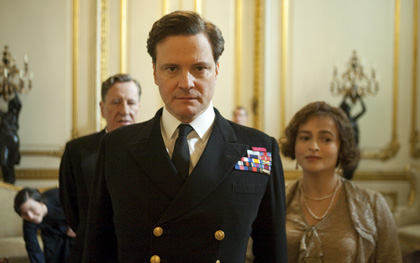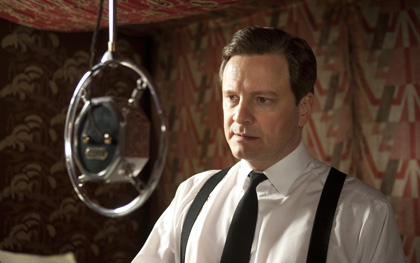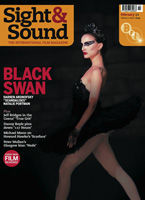Film review: The King's Speech
United Kingdom / Australia / USA 2010

Reviewed by Philip Kemp
Synopsis
Our synopses give away the plot in full, including surprise twists.
London 1925. King George V’s younger son, Albert Duke of York, has to give a speech at the opening of the British Empire Exhibition. His nervous stammer makes his words unintelligible.
Nine years later. Bertie (as he’s known to the family) has tried various speech therapists without success. His wife Elizabeth hears of an Australian therapist, Lionel Logue, whose unorthodox methods are said to be successful. She visits Logue, calling herself Mrs Johnson, and asks him to come and see her husband. Logue tells her that his patients must come to him. Intrigued by Logue’s outspokenness, Elizabeth persuades Bertie to visit him. Bertie starts making progress under Lionel’s eccentric guidance.
George V dies, and Bertie’s self-confident, philandering brother David succeeds to the throne as Edward VIII, but his association with American divorcee Wallis Simpson causes concern – especially when he announces that he intends to marry her. The Archbishop of Canterbury and Prime Minister Stanley Baldwin tell him he must abdicate. Bertie, realising he may become king, is angry and terrified; he quarrels with Lionel and tells him their sessions are over.
Edward VIII abdicates; Bertie succeeds him as George VI. Elizabeth persuades him to consult Lionel again, and with the therapist’s help he negotiates the responses at his coronation without disaster. On 3 September 1939, Neville Chamberlain declares war with Germany. With Lionel guiding him, the king makes a nine-minute radio broadcast rallying his people. Afterwards he and his family stand on the balcony of Buckingham Palace, cheered by a vast crowd.
Review
“Surely,” asks Aussie speech therapist Lionel Logue (Geoffrey Rush), “a prince’s brain knows what its mouth’s saying?” Albert Duke of York, the future King George VI (Colin Firth), throws him a weary glance. “You’re not well acquainted with royal princes, are you?” he retorts.
In its handling of royalty, The King’s Speech neatly has it both ways. We’re given the mystique of the king’s figurehead position and the danger (especially at the outbreak of war) of this emblematic role being undermined by his crippling stammer. “The nation believes that when I speak, I speak for them,” he tells Logue. “And I can’t speak.” At the same time, David Seidler’s screenplay takes mischievous glee in exposing the absurdities of royal protocol. When Albert’s wife Elizabeth (Helena Bonham Carter), sheltering behind a pseudonym, first comes to consult Logue, he suggests that her husband should simply change jobs to one that doesn’t involve public speaking. He’s not allowed to, she tells him. “Indentured servitude?” he inquires. “Something of that nature, yes.” Later, when Logue dismisses the speech therapists Albert has previously consulted as “idiots”, the duke protests, “They’ve all been knighted.” “Makes it official then,” responds Logue.

This dual attitude – at once reverential and disrespectful – aligns Tom Hooper’s film with John Madden’s Mrs Brown (1997), which likewise featured a plainspoken, non-English outsider coming to the aid of a psychologically distressed royal. (Logue’s insistence on calling his royal patient ‘Bertie’ recalls Brown addressing Queen Vic as ‘wumman’.) Firth and Rush make for a no less diverting double-act than Judi Dench and Billy Connolly, to the point where their antics (which include convulsive jaw-wobbling and rolling on the floor) threaten to take over the movie – though Bonham Carter’s Elizabeth, a fount of emotional warmth in a family sorely in need of it, holds her own with more than a hint of mischief. Instructed by Logue to sit on her husband’s stomach and bounce up and down, she chirps gaily, “This is actually quite good fun.” Other supporting roles risk toppling into caricature – not least Timothy Spall, reprising his orotund Churchill from Jackboots on Whitehall – though Michael Gambon effectively sketches in George V as a hidebound old monster, regarding the radio microphone with patrician distaste: “This family has been reduced to those lowest of creatures. We’ve become actors.”
Although he plays up the odd-couple comedy, Hooper knows how to bring out the anguish behind the humour (as he did in 2009’s The Damned United and his 2006 TV movie Longford). Bertie’s stammer, he makes clear, stems from years of abuse in an emotionally dysfunctional family, browbeaten by his martinet of a father and overshadowed by his far more self-assured older brother David (the future Edward VIII, played by Guy Pearce as a preening socialite). There’s a telling moment when, on the death of his father, David collapses in tears into the arms of his mother Queen Mary (Claire Bloom). Behind her son’s back the old lady’s hands flap bemusedly; hugging was evidently never on the British royal curriculum.
Rush excels himself in a rich, humorous performance, slyly sending up his reputation for occasional hamming with some interpolated passages of ripely overacted Shakespeare. But ultimately this is Firth’s film, confirming his status as one of our finest screen actors, with a matchless line in agonisingly repressed Brits. Though he never overplays the pathos of the reluctant future king, he makes us feel it in the simplest lines. “What are friends for?” Logue asks rhetorically at one point. Bertie stares at him bleakly.
“I wouldn’t know,” he responds.
See also
Comment: the end of prestige?: Nick James reads the entrails of ‘quality’ cinema in the Digital Age (August 2010)
The Damned United reviewed by Mark Fisher (May 2009)
Girl with a Pearl Earring reviewed by David Jays (February 2004)
Bridget Jones’ Diary reviewed by Leslie Felperin (April 2001)
Shakespeare in Love reviewed by Philip Kemp (February 1999)
Credits
- Directed by
- Tom Hooper
- Produced by
- Iain Canning
- Emile Sherman
- Gareth Unwin
- Screenplay
- David Seidler
- Director of Photography
- Danny Cohen
- Film Editor
- Tariq Anwar
- Production Designer
- Eve Stewart
- Composer
- Alexandre Desplat



